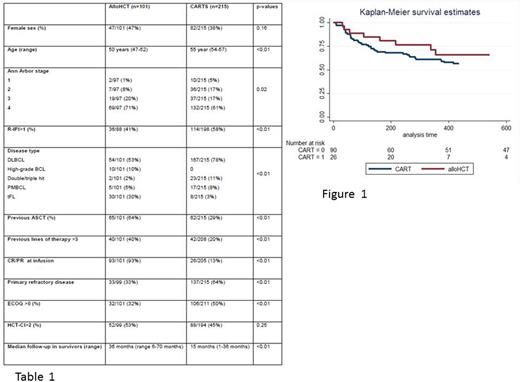Abstract
Introduction The use of anti-CD19 chimeric antigen receptor T cells (CARTS) to treat diffuse large B cell lymphomas (DLBCL) after failure of second line therapy has rapidly been adopted as the standard third-line of therapy. Salvage chemotherapy followed by allogeneic hematopoietic cell transplant (alloHCT) has been substituted even if no prospective randomized trials are available in this setting. We wanted to test the hypothesis that CARTS are at least not inferior to alloHCT, despite well-known differences between the two therapies.
Methods We selected from the Grupo Español de Trasplante y Terapia Celular (GETH-TC) registry patients with the following characteristics: age > 18 years old; DLBCL/primary mediastinal B cell lymphoma/transformed follicular lymphoma; >2 lines of therapy; anti-CD19 CARTS or alloHCT as therapy at relapse. For the CARTS cohort: axicel or tisacel were included; infusion date within February 2019 and April 2021. For the alloHCT cohort: infusion date between January 2016 and December 2020; peripheral blood stem cell graft only; matched (> 9/10 HLA compatibility) related or unrelated and haploidentical donor only; myeloablative or reduced-intensity conditioning regimens. Observation period started from the day of cell infusion (CD34+ or CARTS) in both cohorts. The primary endpoint was progression-free survival (PFS). Secondary endpoints were overall survival (OS), progression-free survival (PFS), non-relapse mortality (NRM) and relapse/progression (Rel/POD) of disease. Also, being alive in complete remission without moderate-severe cGVHD (cGRFS)was included to reflect severe long-term toxicity of alloHCT. Multivariate analysis was used to compensate expected differences.
Results A total of 316 patients (CART=215, alloHCT=101) were included into the analysis. The two cohorts of patients were significantly different in terms of baseline characteristics (table 1), especially due to characteristics of a much more aggressive and refractory disease and older age for the CARTS arm. Median follow-up was 15 and 36 months for the CART and alloHCT cohorts, respectively. For the CARTS cohort, we observed the following survival outcomes at 18 months post infusion: PFS 35% (95% CI: 29-42%), OS 46% (95% CI: 39-54%); NRM 7% (95% CI: 4-10%); Rel/POD 58% (95% CI: 52%-64%). For the alloHCT cohort: PFS 53% (95% CI: 43-62%), OS 58% (95% CI: 47-62%); NRM 28% (95% CI: 19-46%); Rel/POD 19% (95% CI: 11-27%), cGRFS 39% (95% CI: 30-49%). For the primary endopoint (PFS), multivariate analysis confirmed that CART are not inferior to alloHCT. Limiting the analysis to only patients with complete /partial response (CR/PR) (alloHCT=93, CARTS=26), no differences were reported (65% versus 55% PFS at +18 months, p=0.59, (figure 1)). Only CR/PR at infusion (hazard ratio [HR] 0.41, 95% CI=0.24-0.73, p<0.01) and ECOG>0 (HR 1.55, 95% CI=1.12-2.16, p<0.01) had a prognostic impact. However, CART had a significant impact on NRM reduction (HR 0.25, 95% CI: 0.07-0.86, p=0.02). No impact of CARTS versus alloHCT was observed for the other outcomes.
Conclusions Our study showed that, despite a higher-risk population in the CARTS cohort, CARTS did not show to be inferior to alloHCT in terms of survival outcomes. Instead, we confirmed that CARTS are associated to inferior NRM. Our study, confirms that CARTS should be favored in older patients with refractory disease. However, alloHCT is still a good therapuetic strategy for patients with chemosensitive and good performance status.
Disclosures
Mussetti:BMS: Consultancy; TAKEDA: Honoraria; GILEAD: Research Funding; JAZZ PHARMACEUTICALS: Consultancy. Bastos-Oreiro:JANSSEN: Speakers Bureau; INCYTE: Consultancy, Speakers Bureau; NOVARTIS: Speakers Bureau; KITE/GILEAD: Consultancy, Honoraria; Roche: Consultancy, Research Funding, Speakers Bureau. Bailen:GILEAD: Honoraria. Barba:Allogene, Amgen, BMS, Gilead, Incyte, Jazz Pharmaceuticals, Miltenyi Biomedicine, Nektar and Novartis: Consultancy. Briones:Celgene/BMS: Research Funding; Takeda: Consultancy, Honoraria; GSK: Consultancy; Novartis: Consultancy, Honoraria; Gilead: Consultancy; BMS: Consultancy, Honoraria; HOSPITAL SANTA CREU I SANT PAU: Current Employment. Ferra:Janssen, Roche, Gilead, Takeda, Abbvie: Consultancy, Other: Medical meetings funding. Iacoboni:NOVARTIS, KITE/GILEAD, BMS/CELGENE, ASTRAZENECA, ROCHE, ABBVIE, JANSSEN, MILTENYI: Honoraria; NOVARTIS, KITE/GILEAD, BMS/CELGENE: Consultancy. Kwon:Novartis: Consultancy, Honoraria, Other: Support for attending meetings and/or travel; Gilead: Consultancy, Honoraria, Other: Support for attending meetings and/or travel; BMS: Consultancy. Ortiz-Maldonado:KITE/GILEAD, Novartis, BMS, Janssen: Honoraria. Sureda:Astra Zeneca: Consultancy, Honoraria; Pierre Fabre: Consultancy, Honoraria; GenMab: Consultancy, Honoraria; Sanofi: Consultancy, Honoraria; Jannsen: Consultancy, Honoraria; Novartis: Consultancy, Honoraria; Kite: Consultancy, Honoraria; MSD: Consultancy, Honoraria; BMS/Celgene: Consultancy, Honoraria, Research Funding; Takeda: Consultancy, Honoraria, Research Funding, Speakers Bureau.
Author notes
Asterisk with author names denotes non-ASH members.


This feature is available to Subscribers Only
Sign In or Create an Account Close Modal